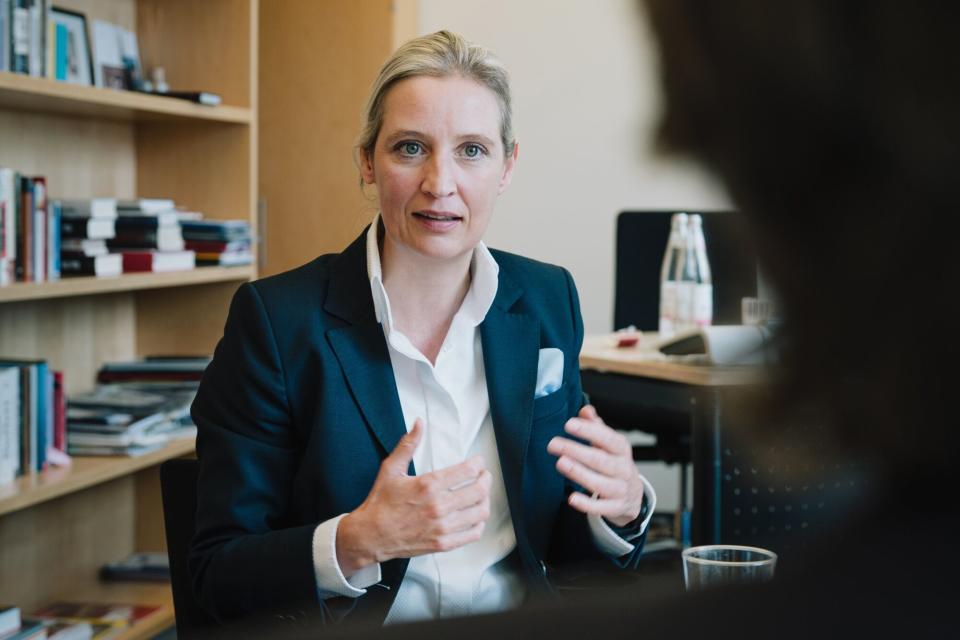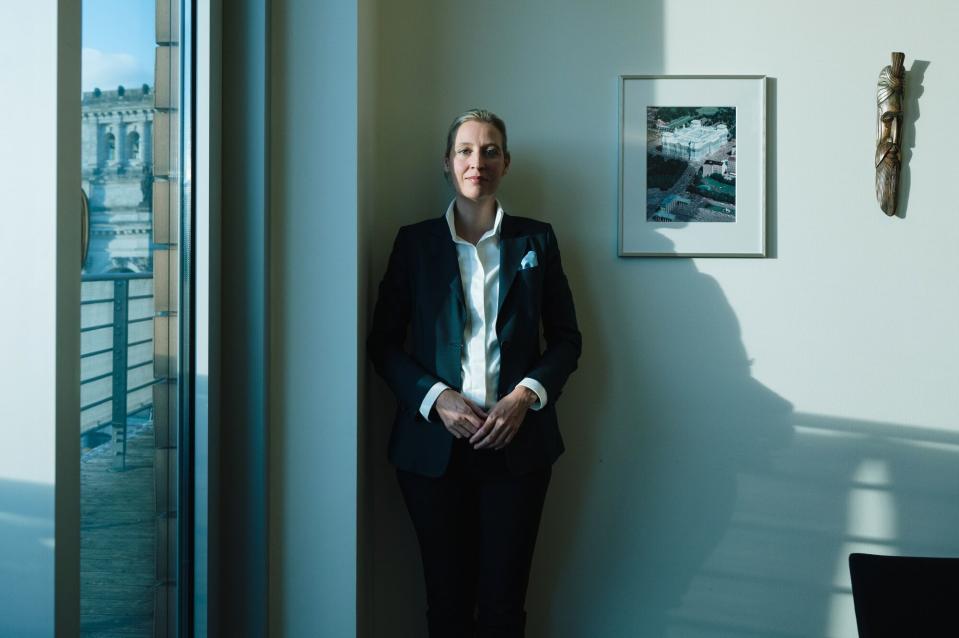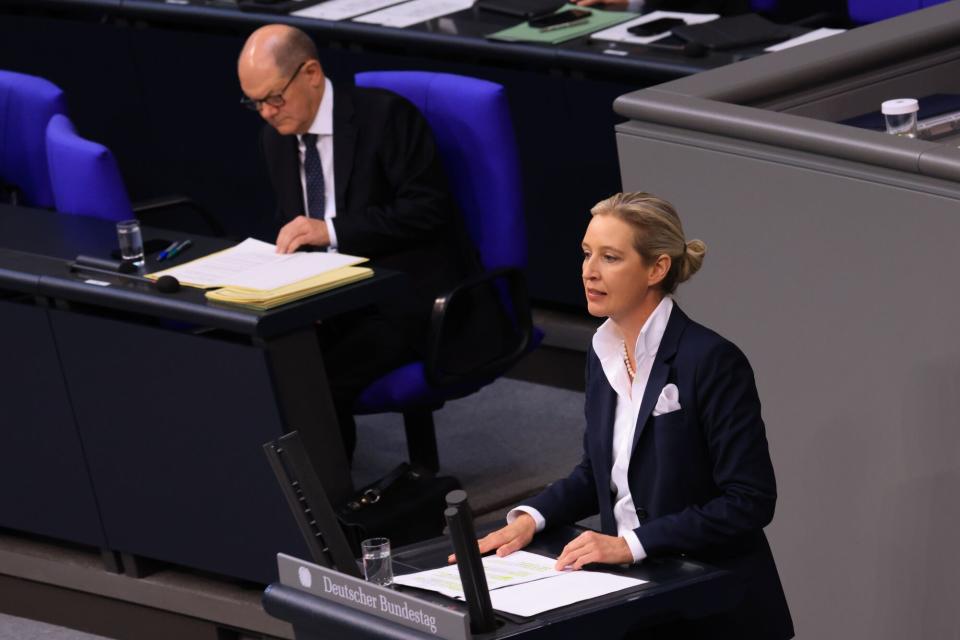The Many Faces of the Woman Taking German Far-Right Politics Mainstream
(Bloomberg) -- Once a year on her birthday, Alice Weidel sits down with her wife over a glass of red wine. The couple ask themselves: Is it all worth it? The hatred, the anonymous threats, the public exposure.
Most Read from Bloomberg
Bitcoin’s 2023 Rally Frays During Brief 7.5% Drop Toward $40,000
Abu Dhabi Is the World’s Newest Wealth Haven for Billionaires
Stocks Make Cautious Start to Event-Packed Week: Markets Wrap
At Weidel’s next birthday — it will be her 45th — she will have plenty to show for these pains. Things are going pretty well for the co-head of Germany’s noisiest party, the so-called Alternative for Germany, usually known as the AfD.
Outpolling Chancellor Olaf Scholz’s Social Democrats, the party now ranks second of the six main parties with 20% support nationwide. In former East Germany it does even better.
Weidel herself is likely to be named the AfD’s first ever candidate for chancellor in the next federal election, scheduled for September 2025. If she succeeds in that unlikely ambition, the Goldman Sachs alum would be the first far-right politician to lead Germany since the end of the Nazi era.
The AfD wants to tear up Europe’s relationship to its biggest economy, putting an end to both the common currency and free movement across its borders. That would mean, in turn, dismantling the principles that bind Europe itself.
Founded in 2013 on a narrowly anti-euro platform, the party has been prone to infighting ever since. Most of its earlier leaders were toppled by members of the AfD's more extremist faction, who forged their anti-immigrant politics out of hostility to former chancellor Angela Merkel’s welcoming stance toward refugees.
Weidel’s path to prominence has been cleared by the likes of Italy’s Giorgia Meloni, the Netherlands’ Geert Wilders and France’s Marine Le Pen who, tapping into grievances about economic security, have polished a once-taboo style of identitarian politics to take it mainstream.
But in Germany, the AfD’s plans — like Weidel’s own designs on the chancellery — are constrained by the fact that rivals have ruled out cooperation.
Weidel herself remains unruffled, having doubled her party’s support with voters nationwide since the 2021 election. “The crazy thing is that right now we don’t have to do much. The government already does everything to destroy itself,” a cheerful Weidel said in an interview with Bloomberg.
From her office on the sixth floor of the German parliament, she has a perfect view of the Reichstag. Here, in recent months, the AfD has turned itself into one of the most vituperative critics of Scholz’s government.
The governing coalition has done much to justify its naysayers. It’s tying itself in knots over a budget crisis which erupted after the country’s top court ruled its spending plans unconstitutional. With speculation growing over how much longer the three-way governing alliance will hold, Weidel could be fighting for the top job sooner than expected.
Last September, Weidel and the party’s co-leader Tino Chrupalla, who is from East Germany and trained as a house painter, presented a 10-point government program in Berlin. Even after it won its first Bundestag seats in 2017 the AfD had been seen as a party of protest. Suddenly, they were talking about governing.
The first thing they would do if they came to power would be to close Germany’s borders, Weidel told Bloomberg. “Illegal migrants will have to leave immediately,” she said, adding convicted criminals without German passports to the list.
Denying the existence of anthropogenic climate change, the AfD says it would abandon the country’s 2050 net-zero emissions target. Asked about the windmills that have been key to the transition off fossil fuels, “I would tear them down,” Weidel said with a smile.
The economics of wind energy don’t make sense, she argued. That defies the findings of Bloomberg New Energy Finance, which reported in July that the German government was attracting record bids from offshore developers. Defiance is a comfortable mode for Weidel.
Scholz himself initially dismissed the AfD as just a “bad mood party.” He changed his tune after their strong showing at state elections in October: “This is about defending our democracy,” he said, upping the urgency. But identifying the far right’s electoral gains as a problem is different to knowing what to do about it.
In the East German states of Saxony-Anhalt, Thuringia and — as of this week — Saxony, the AfD’s regional branches are officially classified as right-wing extremist, which means authorities face fewer legal obstacles to surveiling them.
But that hasn’t stopped the AfD’s leader in Thuringia, Bjoern Hoecke, who likes to employ thinly veiled references to Nazi ideology, from attracting enough support that polls show him on course to win an outright majority in state elections next year.
The recent election result in the Netherlands, where others attempting to cannibalize Geert Wilders’ anti-migrant talking points ended up legitimizing the far-right lawmaker, have underlined the challenge for mainstream parties.
Weidel has her detractors (Economy Minister Robert Habeck: The AfD is “partly conspiracy theorist” and “partly fascist.”). She has her supporters (Steve Bannon: “If Germany has young leaders like her and people who I think represent them so well, who seem to be so well-articulated, so smart, then the party will do pretty well.”)
Before politics, she worked as a consultant for Goldman Sachs and Allianz Global Investors. She wrote her dissertation on the Chinese pension system and lived in Beijing. Today she lives abroad with her two sons and her wife, who is a filmmaker from Sri Lanka, in a small town in Switzerland. “These so-called contradictions are quite obvious,” Weidel says.
Her background and family life puts her alongside other high-profile rightwingers — Wilders and Nigel Farage, the UK’s self-styled answer to Donald Trump, among them — in being far more diverse than the countries they say they want to build.
So too, like many right-wing populists, she leans frequently on ideas of “fake news” and media conspiracy. In Weidel’s case, that’s also how she explains the labeling of her as right-wing. “We see ourselves standing in the middle of society,” she says.
Increasingly she may not, analysts are saying, be too far wrong: “We have to be careful where the middle of society is going,” said Jackson Janes, senior fellow at the German Marshall Fund in Washington DC. “Her professional and academic background might look unusual, but fact is that a number of people with a similar intellectual and social background have become attracted by right-wing ideology.”
Weidel herself rejects the widespread understanding of the AfD as inheritors of the extremist strain of German politics that had been taboo for most of the post-war period. “Even if it’s a wrong narrative, if you repeat it often enough, people will start to believe it,” she says.
“Merkel is responsible for the destruction of this country,” is one of the things Weidel herself is fond of repeating. Sure enough this line has traction with her base, who are motivated as much by distrust of the former chancellor as by distrust of foreigners.
Merkel “started the practice of excluding everyone who thinks differently,” Weidel says of Merkel's border policy — only by this she means excluding those who disagreed with it from the conversation.
In 2015, the former chancellor famously said of the migration crisis, “We will manage this,” and turned her country into one of Europe’s most welcoming for refugees.
Weidel’s own political career bears some similarities with that of Merkel, who like her entered male-dominated world of German politics from the outside. She even claims her as an inspiration, of sorts.
“During my first term in the Bundestag, I had to think of Angela Merkel because I had such hard time building up this parliamentarian group”, Weidel says. “Then I thought: How did she do that, leading such a big party and finding her way around this male-dominated machinery?”
By contrast with Merkel, whose stance toward those fleeing war-torn Syria involved fronting up to those in her party who wanted it to be less generous, Weidel is reluctant to take a stand against her colleagues’ extremist views. Instead, it seems like she has adapted herself to them.
She “managed to sideline all the male conservatives and to introduce a policy which was diametrically opposed to the party’s program,” Weidel says of the former chancellor. “If I did something similar, my own party would kick me out.”
Weidel credits her approach to her upringing in an affluent, middle-class household where she would answer the phone for her father business during his lunch break. “I learnt to be client-oriented.”
She describes her job as channeling the emotions of frustrated voters. “‘Alice’ is the one who expresses the truth for them.”
Early on in her career, she distanced herself from figures like Hoecke, the most prominent member of the AfD’s far-right fringe, and even supported an initiative for his expulsion from the party. Today, she seems to have made her peace with him, although she says she still doesn’t share Hoecke’s extreme views.
"Not all AfD voters are anti-democratic or extremely right wing,” said Sudha David-Wilp, Berlin office director of the German Marshall Fund. But certain figures in the party “have used language that harks back to a darker time in Germany.”
"The big problem is that Hitler is portrayed as absolutely evil," Hoecke said in a 2017 interview with the Wall Street Journal. In parliament, Weidel has herself spoken of the Muslims who number more than five million of her country’s population as “headscarfed girls and state-funded knife-men.”
That language fuels the suspicion of immigrant communities that is dividing Germany society. And yet Weidel insists her supporters are the victims.
“Germany,” she laments, “has become so polarized.”
--With assistance from Christoph Rauwald, Ben Sills, Iain Rogers and Steven Arons.
Most Read from Bloomberg Businessweek
How the Biggest Boutique Fitness Company Turned Suburban Moms Into Bankrupt Franchisees
Salesforce Signals the Golden Age of Cushy Tech Jobs Is Over
Hottest Job in US Pays $80,000 a Year, No College Degree Needed
At World Central Kitchen, José Andrés Is in the Middle of a Mess
Rate Cut Pivot Can’t Come Soon Enough for Debt-Strapped Companies
©2023 Bloomberg L.P.








